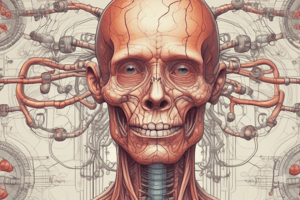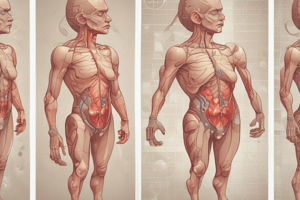Podcast
Questions and Answers
What role do stomach contractions, the brain, and hormones play in hunger?
What role do stomach contractions, the brain, and hormones play in hunger?
Receptors throughout the digestive system monitor levels of glucose and send signals to the hypothalamus in the brain. The hypothalamus then sends out appetite-stimulating hormones and after eating, appetite-suppressing hormones.
What is our 'set point' and how does it interact with metabolism to influence weight gain/loss?
What is our 'set point' and how does it interact with metabolism to influence weight gain/loss?
A set point is a genetically determined range of weight that the body tries to maintain. Those who become overweight develop a new set point that is difficult to shift, and metabolism slows to maintain the new weight.
How is obesity influenced by our genetics?
How is obesity influenced by our genetics?
Adopted siblings eating the same meals end up with a BMI resembling their biological parents. Identical twins have similar weights even when raised apart.
Define achievement motivation and what helps us satisfy it.
Define achievement motivation and what helps us satisfy it.
Define the difference between emotions and mood.
Define the difference between emotions and mood.
What are the different perspectives on how bodily arousal and cognition interact to trigger or display emotions?
What are the different perspectives on how bodily arousal and cognition interact to trigger or display emotions?
How does context influence the detection of emotions?
How does context influence the detection of emotions?
How can expressions, facial feedback, and physiology affect emotions?
How can expressions, facial feedback, and physiology affect emotions?
Define, explain, and give examples for 4 perspectives on motivation.
Define, explain, and give examples for 4 perspectives on motivation.
Define and give examples of instinct theory.
Define and give examples of instinct theory.
Define and give examples of the hierarchy of needs.
Define and give examples of the hierarchy of needs.
Define and give examples of arousal/optimization theory.
Define and give examples of arousal/optimization theory.
Define and give examples of drive reduction theory.
Define and give examples of drive reduction theory.
Flashcards are hidden until you start studying
Study Notes
Hunger and Eating
- Stomach contractions, hormones, and the brain interplay to regulate hunger.
- Receptors in the digestive system monitor glucose levels and signal the hypothalamus.
- Hypothalamus releases appetite-stimulating hormones before eating and appetite-suppressing hormones after eating.
Set Point Theory
- Individuals have a genetically determined "set point" for body weight.
- The body strives to maintain this set point for optimal health.
- Weight gain can create a new, harder-to-shift set point; metabolism adjusts to sustain it.
- Starvation decreases metabolism further and triggers hunger when weight falls below the new set point.
Genetics and Obesity
- Biological parents’ genetic influence on body mass index (BMI) outweighs environment; adopted siblings show similar BMI patterns to biological parents.
- Identical twins exhibit similar weights even when raised separately.
- Multiple genes are involved in weight regulation.
Achievement Motivation
- Defined as the drive for accomplishment, skill mastery, and resource control.
- Key components to satisfy achievement motivation include:
- Discipline to maintain focus despite distractions.
- The 10-year rule indicating time needed to achieve expertise.
- Grit reflecting persistence and hardiness under stress.
Emotions vs. Mood
- Emotions are brief, acute changes in consciousness tied to significant situations.
- Moods are prolonged affective states that subtly influence overall emotional experience.
Theories of Emotion
- James-Lange Theory: Physiological response occurs before emotional experience.
- Cannon-Bard Theory: Physiological response and emotional experience occur simultaneously.
- Singer-Schachter/Two-factor theory: Emotional experience arises from physiological reaction combined with cognitive labeling.
- Zajonc, LeDoux, Lazarus: Emotions can arise from physiological responses without conscious cognition.
Context and Emotion Detection
- Contextual factors significantly affect how emotions are perceived and interpreted.
Expression and Emotion Influence
- Facial expressions, feedback, and physiological states can modulate emotional experiences.
Perspectives on Motivation
- Various motivational theories explain human behavior through different lenses such as biological needs, psychological drives, and social influences.
Instinct Theory
- Suggests innate instincts drive behaviors, with some reflexive actions seen in infants.
- Human behavior is influenced by genetics but is less constrained than in other animals.
- Evolutionary theory has largely replaced instinct theory in explaining behavior.
Hierarchy of Needs
- Proposed by Abraham Maslow as a motivational framework where:
- Self-transcendence and self-actualization represent the highest goals.
- Esteem, belongingness, safety, and physiological needs build the foundation.
Arousal/Optimization Theory
- Suggests behaviors are influenced by the need to regulate arousal levels, seeking to optimize emotional and physiological states.
Drive Reduction Theory
- Emphasizes the motivation to reduce physiological drives, challenging individuals to take action to restore balance.
Studying That Suits You
Use AI to generate personalized quizzes and flashcards to suit your learning preferences.




